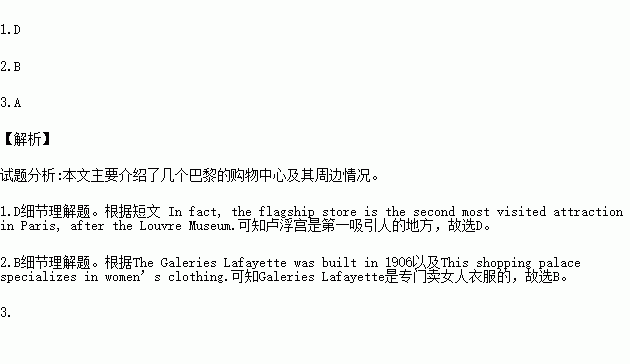题目内容
If you are heading for Paris this year, be sure to include at least one of these shopping malls in your schedule.
Au Printemps
Tel: 01133014282
Located near the Paris Opera, this huge store is well-known for household goods as well as its fashion. The store also offers many services to overseas visitors, including shipping, translation and a personal shopping service. Au Printemps, whose name means springtime, hosts several free fashion shows each week. The store’s beauty department has one of the world’s largest selections of perfumes(香水).
Galeries Lafayette
Tel: 01133014283
The Galeries Lafayette was built in 1906. It is as much fun to look at as it is to shop in this 10-storey shopping palace. In fact, the flagship store is the second most visited attraction in Paris, after the Louvre Museum. This shopping palace specializes in women’s clothing. Make sure to take in the view from the tea shop on the top floor; it’s well worth the visit.
Le Bon Marche
Tel: 01133014439
This stylish Left Bank department store was Paris’ first such store. Designed by Gustave Eiffel, Le Bon Marche is particularly known for its food hall, its wedding shops and its selection of modern clothes.
La Forum des Halles
Tel: 01133014476
This modern, underground shopping center was built in 1979. La Forum des Halles, the three-storey-tall shopping center offers everything from souvenirs to haute couture(高级女子时装)to entertainment, such as first-run movies and street performers. The shopping center is attached to the busy La Halle-Chatelet metro station and can be easily reached from all over Paris.
1.Which of the following places attracts the most visitors according to the passage?
A. Au Printemps. B. The Paris Opera.
C. La Forum des Halles. D. The Louvre Museum.
2.Which of the stores pays its special attention to women’s dressing?
A. Le Bon Marche.
B. Galeries Lafayette.
C. La Forum des Halles.
D. Au Printemps.
3.We can learn from the passage that ___________________.
A. La Forum des Halles is next to the metro station
B. Au Printemps is famous for its food hall
C. the clothes in Le Bon Marche are usually very cheap
D. the tea shop that is worth visiting is on the ninth floor of Galeries Lafayette
 阅读快车系列答案
阅读快车系列答案
